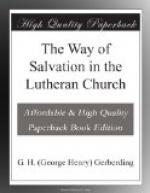To illustrate. Two persons have broken the laws of their land, are guilty, condemned, and suffer the penalty in prison. To one comes a message of pardon from the king. The prison doors are opened and he goes forth a free man. The law cannot again seize him and condemn him for the crimes of which he is pardoned. But as he goes forth among his fellow-men he realizes that though released from punishment, and negatively righteous, he has no standing, no character, no positive righteousness, unless he earn and merit it for himself.
To the other criminal also comes a message of pardon from his king. In addition to pardon, or release from punishment, he is assured that his king has adopted him as his son, will take him into his family and endow him with his name and all the privileges of his house.
Now this pardoned one has a double righteousness; Negatively, pardon and release from punishment; positively, a name, standing, character, honor, and the richest endowments of the kingdom.
Even thus has the Son of God wrought out for us a two-fold righteousness, viz.: Negatively, by His sufferings and death, the forgiveness of sin and release from punishment; and positively, by His life of obedience, the appropriation of a perfect righteousness, a name and a place in His kingdom, with all its honors and blessings.
In the procuring of this double righteousness, Christ wrought out first the positive and then the negative. In the conferring of it He gives first the negative and then the positive.
And therefore the two-fold message of consolation. Is. xl. 1, 2: “Comfort ye, comfort ye my people, saith your God. Speak ye comfortably to—(i.e., speak ye to the heart of)—Jerusalem, and cry unto her that her warfare is accomplished, that her iniquity is pardoned; for she hath received of the Lord’s hand double for all her sins.”
This justification has been purchased and paid for. But it is not yet applied. The sinner has not yet appropriated it and made it his own. How is this to be done? We answer: BY FAITH. Faith is the eye that looks to Christ. It sees His perfect atonement and His spotless righteousness. It is, at the same time, the hand that reaches out and lays hold of Christ, and clings to him as the only help and the only hope. This faith, springing from a penitent heart, that realizes its own unworthiness and guiltiness, renouncing all claim to merit or self-righteousness, casts itself on the divine Saviour, trusts implicitly in Him, and rests there. This faith justifies. Not because it is an act that merits or earns justification. No! In no sense. Christ has earned it. Faith only lays hold of and appropriates what is already purchased and paid for.
There certainly can be no merit in our faith, because it is itself a “gift of God,” as the Scriptures declare. He that has the faith is justified, acquitted, forgiven. The appropriation or application, is when we believe with all the heart on the Son of God.




